🔍 Top headlines
The accounting profession needs to fundamentally rethink how firms are built, according to a new workforce transformation report from the Indiana CPA Society. The study recommends ditching the traditional pyramid structure—where entry-level staff form the base—in favor of an "inverted pentagon" model that flips the script.
The proposed framework calls for fewer entry-level positions, wider middle layers packed with specialists, and accelerated skill development programs. The reasoning is stark: Firms are facing projected workforce reductions of 20% or more, while demand for specialized advisory services continues climbing.
Instead of resisting these shifts, the report recommends leaning into them. It urges firms to prioritize hiring experienced professionals and specialists who can make an immediate impact, while rethinking the usual long climb from junior staff to senior advisor. It's a bold rethink of the traditional firm model—one that reflects today’s talent landscape and better positions firms to grow their advisory services.
SEC taps accounting veteran Kurt Hohl as chief accountant
The SEC named Kurt Hohl as its new chief accountant, effective July 7, bringing nearly four decades of accounting expertise back to the agency. Hohl, a former EY partner, isn't new to the SEC; he previously served there from 1989 to 1997, and authored the agency's Financial Reporting Manual, a cornerstone reference for public company reporting.
His appointment comes at a time when the SEC continues navigating complex financial reporting challenges. Hohl's background combines deep regulatory knowledge from his previous SEC tenure with extensive practice experience from his decades at EY.
For the accounting profession, his return brings someone who has worked on both sides of financial reporting oversight—crafting the guidance that shapes how companies report and auditors work, then spending years implementing those standards in practice. His dual perspective could prove valuable as the SEC addresses ongoing challenges in audit quality, financial reporting standards, and regulatory compliance.
States abandon grad school requirement, opening faster path to CPA
The accounting talent shortage is driving dramatic policy changes across the country. Nearly 20 states have amended their CPA licensing laws since January, allowing candidates to substitute work experience for the traditional fifth year of education. The result? Students are ditching graduate school plans and jumping straight into the workforce.
It's a seismic shift that addresses two pressing problems at once: firms get much-needed talent faster, and prospective CPAs avoid additional student debt and start earning sooner. Utah and Colorado, among others, are leading the charge, recognizing that the traditional 150-credit-hour requirement has become a barrier rather than a quality standard.
The changes reflect a broader rethinking of professional credentialing across industries. For firms, it means access to motivated candidates who are ready to work and learn on the job rather than spend another year in the classroom. Early indicators suggest strong interest from students, with many switching their plans as soon as the new pathways became available.



